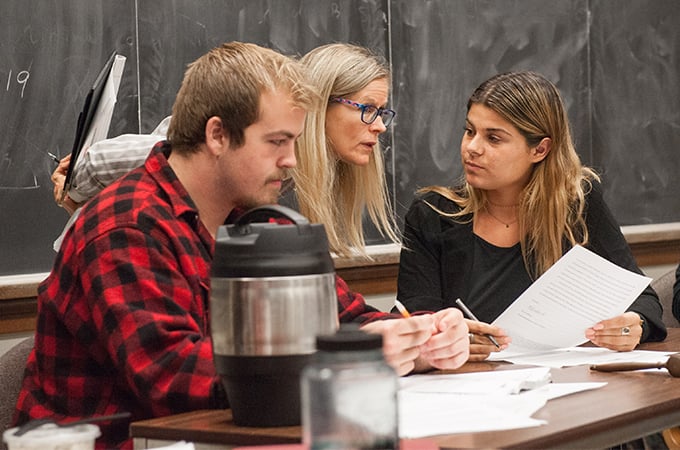In the course description for her U.S. Congress class, Professor Renée Van Vechten describes the United States Congress as “simultaneously reviled and venerated ... a tangle of contradictions.”
It’s this quandary that students to explore by inhabiting the roles of real U.S. representatives, a simulation of a Congressional session that creates opportunities for learning, skill-building, and leadership.
The class begins with the study of the U.S. Congress’s history, theoretical foundations, and current processes, but it’s the semester-long simulation that teaches students the most about legislative decision-making. “It’s a rough approximation of reality, one designed to help them understand just how complex lawmaking really is,” says Van Vechten.
Part research, part strategizing, and part performance, the class delivers a wholly extraordinary learning experience.
How it works
Students are able to request parameters for their character—Republican or Democrat, committee preference, and region—although ultimately the assignments reflect the actual composition of the current Congress, in this case, the 116th.
“I try to give students the opportunity to portray the characters they prefer, but at the same time we need to capture the geographic diversity of the United States,” says Van Vechten, who adds that four of 15 students depicted female House members in the last class for similar reasons. “We also portray who’s actually in charge, and right now the Democrats lead the House. That alone teaches students lessons about power, because the majority party always wins in the House, and the minority party is deliberately excluded from a lot of aspects of lawmaking and legislating. However, we bend the rules a bit in our simulation so that everyone gets a chance to participate fully.”
Students research representatives’ political history and study their constituencies to realistically represent them. Then activities include introducing plausible bills into Congress, shaping bills in committees, and voting for or against them on the House floor. This year, the class was organized into two committees, says Van Vechten: the Judiciary, which is “a hotbed of moral issues,” and Energy and Commerce, which covers “everything from health care to business.”
Alongside lawmaking, the “representatives” interact with “constituents”—students from Van Vechten’s Introduction to American Politics class, who, like real constituents, wrote letters to their representatives, provided bills to be introduced into the process, and could appear as witnesses in committee hearings. The last few classes culminated in full floor sessions, where posturing and debates ensued, and laws were passed—or, on occasion, killed.
“It’s a lot of work, but I wanted to dive much deeper into [law making] because I thought it was really interesting,” says Kristen Sauceda ’20, who portrayed Rep. Jerry Nadler from New York’s 10th Congressional District, which includes Manhattan, during the spring 2019 semester.
Grooming informed citizens and future lawmakers
Van Vechten first began teaching a congressional simulation in 2005, and many of her former students now work in state and federal government, including the actual U.S. Congress. Kara van Stralen ’10, now the chief of staff for California Democratic U.S. Rep. Mike Levin, had previously worked for U.S. Sen. Maggie Hassan and U.S. Sen. Cory Booker.
“The whole Redlands Government Department (now the Political Science Department) was pretty influential in my career path,” she says, “but the Congress class was really fun because we got to be creative. We weren’t just reading a book and then reciting the information.”
Van Stralen also says that Van Vechten’s Congress class was just like a course in grad school; she adds, “It was an awesome opportunity to gain the skills that I now use every day. I’m constantly having to reach out to Democrats or Republicans and come up with ways to move legislation, so it was definitely realistic because the things that we did in that class, I’m still doing now—just on a much larger scale.”
Matthew Rafeedie ’20 grew up in a politically conservative family, and has always been interested in politics. “I loved this class to death,” he says. “In class, I found that Republicans and Democrats could actually come to an agreement, but they can’t vote for each other’s policies due to partisanship.” At least two Republican bills did pass the Democratic-led House this semester in the mock Congress—a testament to students’ communication skills.
Like Van Stralen, Rafeedie hopes to bring lessons he learned in Van Vechten’s class to his future career in government, starting with an internship this summer at a California state senator’s office: “I realized that conservatives do a really poor job at communicating their ideas to people. As a minority, I’m really passionate about letting people know that conservatives can—and should try—to communicate across the aisle. If you just give up on certain groups and then don’t even try to communicate, you lose the war on ideas.”
Sauceda, a Hunsaker Scholar who had interned for U.S. Rep. Pete Aguilar ’01 before taking Van Vechten’s class, echoed Rafeedie’s sentiments. “Coming into the class I did not realize how complex [the congressional process] was,” she says. Being part of the simulation cemented her resolve to work in public service—and write policy that will affect Americans now and in the future.
And really, that’s Van Vechten’s goal. “This is not just about playing a role,” she says. “It’s about our students considering, ‘What if I had the power? How would I make the world a better place if I wrote a bill to do this or that?’ You’re not really passing policy, but you get a sense of how great it would be if you were able to do that. And that helps you imagine the possibility of doing it ‘for real.’”
Learn more about Van Vechten and about studying political science and public policy at the University of Redlands.






